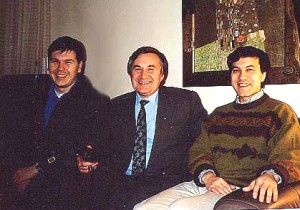|
N 4-5, 10.07.2001
BROADCASTING IN TATAR: My work for the Tatar-Bashkir Service of Radio Liberty PART II Recently I read a book by a former director of the Russian Service of Radio Liberty, Oleg Tumanov. In his book, entitled "Tumanov: Confessions of a KGB Agent", Tumanov describes how he was recruited by the Soviet intelligence agency and given the task of spying for the USSR as an employee of Radio Liberty. After spending twenty years at Radio Liberty, Tumanov returned to the Soviet Union in 1986 only to witness the gradual collapse of the Communist system. His book, published in 1993, contains the following paragraph: "Today I very rarely leave my apartment. I don’t have a job and I live on the pension that the state pays me. I spend my days reading books and papers. I go to bed early and rise late. I’m 48 years old, but I sometimes feel like a very old man." It seems to me that Oleg Tumanov wasted a huge part of his life and ended up an unhappy and lonely man. How could this happen to a seemingly intelligent person? What was his miscalculation in life? The answer, it seems to me, is rather simple. He devoted his life to a goal lacking moral substance. Had he chosen a lofty and noble goal, such as freedom and justice for the oppressed and the downtrodden, he would have become a winner no matter what happened to the particular government, institutions, organizations, or ideology that controlled him. Countries, governments, institutions, organizations and ideologies emerge, develop, thrive, decline, collapse and eventually disappear altogether. There is no sense in devoting one’s life to things that are so transient. The cause of fighting for freedom and justice, on the other hand, is eternal. It will always remain noble and worthwhile. It will always inspire and bring happiness to a person throughout his whole life. Such thoughts came to my mind as I compared the lives of Oleg Tumanov and Garip Sultan. One of the most noble persons I’ve known in my life, Garip Sultan will always remain a saintly figure in my memory. He played a crucial role in shaping the Tatar-Bashkir Service and making it one of the best language services at the Radio. But in contrast to some other colleagues, his devotion to the Radio was not absolute. He was not obsessed by what I would call "institutional loyalty." For him, the Radio was a vehicle for achieving the greatest goal of his life: justice and freedom for the Tatar people. If the Radio had not existed, he would have found some other venue for serving the Tatar people. He was lucky that his personal goal did not contradict the Radio’s mission in any practical way. What was then, Radio Liberty’s mission? In my opinion, the Radio had three distinct missions - official, real, and historical. Officially, the Radio’s goal was to disseminate truthful information to the peoples of the USSR and Eastern Europe. No government in the world, however, is so altruistic as to spend millions of dollars just to inform or educate the population of some foreign countries. The goal, of course, had nothing to do with education. The aim was to undermine ideologically the USA’s main enemy, the USSR, as well as its satellites. That was the real mission of Radio Liberty. But the Radio unintentionally carried out yet another mission, namely, raising the ethnic and religious consciousness of the non-Russian peoples of the USSR and Eastern Europe. The latter mission was perhaps the most important one and what I would call its historical mission. Mr. Sultan’s contribution to the historical mission of Radio Liberty is hard to over-estimate. My first day in Munich I spent getting acquainted with my colleagues and the office itself. From the next day on I was expected to start writing scripts for broadcasting. Mr. Sultan suggested that I choose a radio pseudonym for myself. Everybody else already had one. Sultan himself broadcast under the name Fanis Ishimbay, Hairettin Gyulechyuez was "Hairettin Sadyk", Farida Wahlroos was "Farida Hamit", Ferit Agi was "Ferit Idelle", Ashraf Torpish worked under the name "Soyem" and Mr. Galim in New York wrote under the pseudonym "Musabai". I spent a whole day trying to find a good pseudonym for myself. Finally I chose "Irek Kazanli", because I wanted my pseudonym to include a reference to my native city (Kazan) and to freedom (Irek). From that day on my radio programs would usually start with the following words: "Isenmesez, hormetle tinglauchilar! Mikrofon aldinda Irek Kazanli." (Hello, dear listeners. Irek Kazanli is at the microphone.)
Nuri Resuloglu, Rimzil Valiev, chief of Kazan bureau of Radio Liberty, Sabirjan. My typical working day consisted of translating a text from an English or Russian source, turning the text into a script for broadcasting and, finally reading it into a microphone inside a special sound-proof studio. Later, Nuri would combine all the scripts into a half-hour program, which would be broadcast and re-broadcast on short waves to Idel-Ural, Central Asia and the European part of Russia. Working under Sultan’s supervision was not easy, because he was a perfectionist and a workaholic. He would personally edit everyone’s scripts and make numerous corrections, even if a script was near-perfect. Sometimes I wondered whether he was just unconsciously trying to impose his personal writing style on everybody else. Sultan was highly respected by the Americans at RFE/RL, who made up most of the management and research personnel at the Radio. I was told by some of them that Sultan was responsible for raising the professional standards of all the Turkic language services at the Radio. In the 1950’s, a typical radio program of a Central Asian service consisted of nothing but plain reading. An announcer, without even introducing himself, would start reading a text, which basically would fill up the whole program. There were no musical interludes, no schedule announcements, no station identification, let alone separation of editorial position from a journalist’s or interviewee’s point of view. All of these professional innovations were initially introduced by Sultan to the Tatar-language programming. Later, the other Turkic services, which routinely looked up to and copied the Tatar-Bashkir Service, also introduced these novelties. It was not uncommon for members of other Turkic services to take copies of Mr. Sultan’s scripts and just translate them into their own languages. Part of the reason for such dependence on the Tatar-Bashkir Service had to do with the fact that many employees of the Turkic services lacked any journalistic education. Being an ardent anti-Communist was sometimes the only qualification necessary for being employed by the Radio. Mr. Sultan, on the other hand, had a journalistic background and a doctorate degree in law from Hamburg University. Radio Liberty's employees had a hard time fitting into German society. Munich’s population was rather homogeneous and a bit xenophobic. Nevertheless, life in one of Germany’s most prosperous cities was quite comfortable: clean and safe streets, traditional German orderliness, shops full of goods, relative proximity to the other parts of Germany and Europe, including the Alpine resorts, and so on. During my short stay in Munich in 1986, I was quite impressed by the city. I liked its Gothic-style city hall, the Marienplatz - the main shopping square, the Englischer Garten - a park created in English traditions, and the city’s polite and well-behaved residents. Before my return to New York, I caught a glimpse of Oktoberfest - the famous Bavarian beer festival.
Englischer Garten. Nevertheless, I felt happy to be back in New York. By that time I was already in love with Manhattan, despite its unsafe streets, stifling subways, rude taxi drivers and garbage-filled backyards. The next year, 1987, passed relatively uneventfully but 1988 brought some important events that affected the Tatar-Bashkir Service. On one typical morning in October I woke up, washed up, ate breakfast, and started reading the fresh issue of the New York Times. Suddenly my eyes caught a huge headline announcing that Moscow had stopped jamming Radio Liberty’s broadcasts. I almost jumped from excitement: no longer will our programs be hard to hear! Many more Tatars will be able to learn the truth about the Soviet system! That was one of the most memorable days of 1988. Another memorable day, although for a tragic reason, was January 28, 1988. On that day Mr. Galim passed away. He died in St. Claire’s Hospital after suffering a heart attack at the Radio a few days earlier. (I had found Mr. Galim collapsed on the floor of his office; colleagues thought he was taking a nap.) His dog, Muki, was adopted by one of Mr. Galim's neighbors. The next year, 1989, brought more bad news: Our beloved Ashraf, the slightly sarcastic but always amiable woman who was liked by everyone at the Radio, died of cancer. In April, Mr. Sultan shocked everybody by suddenly retiring from his position and leaving the Radio. There were rumors that Mr. Sultan and Mr. Agi had a bitter falling out. Mr. Agi became the new Director of the Tatar-Bashkir Service. The new director’s style of leadership was very different from Mr. Sultan’s. Mr. Agi rarely read or edited his subordinate’s scripts. He neither encouraged nor discouraged individual initiative. He impressed us all with the imperative of strictly following Radio Libertry’s internal policy guidelines. Mr. Agi was rather detached from the other members of the Tatar-Bashkir Service and always kept a distance between himself and his subordinates. To me, he didn’t seem as overtly passionate as Mr. Sultan about the Tatar cause, although I knew about Mr. Agi’s active involvement in Tatar organizations in Turkey. Mr. Agi was a very astute man, completely fluent in German, Turkish, Tatar and, to a lesser degree, in Russian. Unlike Mr. Sultan, he payed more attention to politics, rather than Tatar culture and history. This was the correct approach, given the changes that started happening in Russia in the late 1980’s. Mr. Agi developed a network of Tatar stringers in Russia and grew increasingly reliant on personal contacts with Tatar public figures and politicians. In the 1990’s Mr. Agi developed personal ties with Tatarstan’s President Mintimer Shaimiev. These ties had both positive and negative effects on the Tatar-Bashkir Service. On the one hand, direct contacts with Tatarstan’s leaders made it easier for Mr. Agi to travel to Tatarstan and to persuade its leadership to allow broadcasting Radio Liberty’s Tatar-language programs on local medium waves. On the other hand, such contacts made him reluctant to allow broadcasting of criticism of Tatarstan’s leadership. Tatarstan’s political opposition became increasingly critical of Tatar programs and started calling the Tatar-Bashkir Service "a mouthpiece of President Shaimiev."
© «THE TATAR GAZETTE» |

